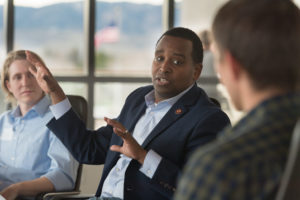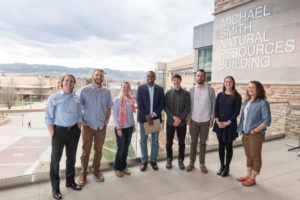
Comforting, invigorating, eye-opening: These were the words used by graduate students in the Warner College of Natural Resources to describe an April 15 meeting with U.S. Rep. Joe Neguse, who represents Colorado’s Second District.
The seven graduate students, almost all of them from the Department of Geosciences, invited the freshman congressman to campus, where he discussed his dedication to backing evidence-based policy. He also offered advice on how the graduate students could serve as a resource for him and his team.
Neguse, who was elected to his first term in November 2018 to represent the district that includes Larimer County, said that he would like to find ways to leverage the skills and ingenuity of students in the room.
“We certainly try to apply evidence-based information in trying to decide which bills to support,” said Neguse, the first African-American member of Congress in Colorado history. “It is sorely needed.”
Research projects that the students work on include small earthquake detection, glacial seismology, structural geology, river function, erosion in small watersheds, the use of geological mapping to study faults and predicting the timing of snowmelt in Colorado.
“Your respective portfolios all relate to the elephant in the room, climate change,” said Neguse, after listening to the students discuss their research. “It was certainly an issue that I was passionate about before I ran for Congress.”
Neguse serves as a member of the House Judiciary Committee, the House Natural Resources Committee, and the House Select Committee on the Climate Crisis.
Policy discussions
Rosie Duncan, who is pursuing a master’s degree in watershed science, noted that the day of his visit coincided with the closing day of public comments on proposed changes to the Clean Water Act.
“Colorado is going to be hit pretty hard if those protections are lifted,” she said.

The graduate students also discussed proposed legislation on landslide preparedness in Colorado and possible budget cuts for the National Science Foundation that would affect early-career researchers.
Duncan thanked Neguse for his involvement with his House committees.
“I really appreciate someone reaching across the aisle to protect Colorado lands,” she said. “It’s noticed and appreciated.”
Neguse suggested that the students send his team ideas for legislation related to the climate and the environment.
“If you have ideas, whether they are large in scope or big ticket, like carbon pricing, or if it’s much narrower, let us know, send those our way,” he said. “We are trying to find bills that would be politically palatable, but that would still move the needle in the fight against climate change.”
Inspired to get involved
David Heath, who is working on a master’s degree in geophysics, said that he was inspired to reach out to the lawmaker after taking part in Voices for Science, a year-long program sponsored by the American Geophysical Union that provides training in science policy and science communications.
Heath said the program helped him learn the best ways to make contact and interact with a policymaker or staff, to raise awareness about issues critical to STEM – science, technology, engineering and math – policy.
While attending a December 2018 meeting of the American Geophysical Union in Washington, D.C., Heath and fellow graduate students visited Capitol Hill and spoke with lawmakers, including staff from Sen. Michael Bennet’s team. When they returned to Fort Collins, they wondered: Why not do the same thing in our district?
Enter Duncan, who reached out to Neguse’s district office, and arranged the initial meeting with Kim Redd, senior constituent advocate. The students invited the congressman to visit campus for a roundtable discussion.
Heath said Redd made it clear: We want to hear from students, and we want to know what’s on your mind.
“As we learned, his priorities and our research interests align,” said Duncan.
Some of the graduate students said that they’d previously been involved in politics on a personal level, while others, like Hank Cole, who is pursuing a master’s degree in seismology, had never been involved until recently.
He and Nikki Seymour, who is pursuing a doctorate in structural geology, attended the Rocky Mountain West CommSciCon, held at CSU in October 2018. The aim of the event is to empower future leaders to share the results from research with broad audiences.
“Students are in this unique scenario,” he said. “We are getting to that expert level in our field, and we all want our science to have an impact. What’s the point if we’re not spending time to have an impact?”
Seymour also said the strength-in-numbers strategy has been helpful.
“It makes it approachable,” she explained. “How do I get involved with politics? That can be daunting, but with a group of people to support you and divide up tasks, it’s approachable.”
Heath acknowledged that a good politician will make most anyone feel comfortable in a public setting. But Rep. Neguse “seemed excited to engage with us in the future, and gave us concrete steps that he may not have extended to just anybody in the district. He’s ready to engage with our group in particular, the Department of Geosciences and the Warner College.”